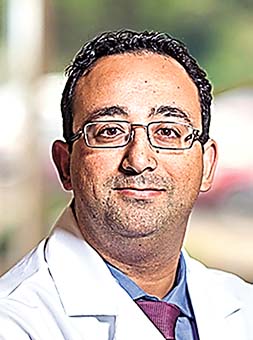Partnership between Portage, Marquette valuable

Khouri
The Portage location in Hancock is only one of the several UP Health System locations across the Upper Peninsula. All of the facilities work together to ensure that the people of the U.P. get the best care possible as close to home. One example of this is the relationship between UPHS – Portage and UPHS – Marquette.
Being a larger hospital in a larger population center, UPHS – Marquette, with its brand new building and campus, is able to offer services to patients in the western U.P. that would not otherwise be available without traveling to Minnesota or Wisconsin. The cardiology department offers many such services.
Patients in the western U.P. that have heart problems are often referred to UPHS – Marquette for services ranging from advanced diagnostics, to stinting, to valve replacement, pacemakers, and more, according to Dr. Yazan Khouri, an interventional cardiology specialist at UPHS – Marquette.
Dr. Khouri conducted residencies and fellowships downstate before coming to UPHS – Marquette three years ago. Going on the last two years, he has also been holding office hours at UPHS – Portage.
“I try to be up there at least twice per month. Mainly I see patients for cardiac disease,” said Dr. Khouri. “… I also see vascular patients.”
While some of the patients that Dr. Khouri sees are self-referred, most of them are referred to him and other heart specialists by their primary care providers.
“Most of the patients are referred by their primary care provider. Insurance companies, unfortunately, usually require that a primary care provider refer patients to a specialist,” said Dr. Khouri.
As a result, he recommends that people who believe that they are having heart problems talk to their primary care provider first, unless in the event of an emergency like a heart attack.
While many readers will be familiar with the symptoms of a heart attack, many forms of heart and vascular disease have different symptoms that can last for a comparatively long time before becoming severe.
“People need to understand that vascular disease involves the whole body,” said Dr. Khouri. “For the heart, the most common symptoms are chest pains … not pain like we usually understand pain, more like tightness or pressure.”
Chest pains due to heart problems can also be differentiated from pain due to other causes by timing. They usually only come on during or after physical activity. Fluttering and shortness of breath during or just after physical activity can also be a sign of heart and vascular problems.
A related condition, called “peripheral artery disease,” can often be recognized by symptoms in the legs also during or shortly after physical activity.
“One of the most common symptoms is fatigue or burning in the legs after walking a certain distance,” said Dr. Khouri.
Other symptoms include leg discoloration or the legs being different temperatures.
Once a patient has been referred to Dr. Khouri or one of the other cardiologists, they usually go through a standard process. Patients are typically asked to provide identification and insurance information before filling out a short form. This form will ask about things like medical and surgical history, family history and any medications being taken. This information can help doctors identify problems as well as provide the proper treatment. The patient is then seen by a nurse, who takes the patients vitals and asks a few more questions. Finally, the patient sees the heart specialist, who will examine the patient and talk with them more in-depth about their symptoms. After this process, the patient will be scheduled for a follow-up testing, usually within a month.
“Most of the testing we are able to do at Portage,” said Dr. Khouri. “… only if treatment is needed will we transfer them to Marquette.”
Dr. Khouri also talks to his patients about things that they can do to prevent heart disease or to prevent it from worsening.
“When we talk about vascular disease, there are preventable measures and there are things we can’t avoid,” said Dr. Khouri.
Things that you cannot avoid involve your biological sex, your family history, and other risk factors that you are born with.
Things that you can do to maintain a healthy heart and vascular system include getting at least 30 minutes of physical activity per day, and having a healthy diet. Dr. Khouri recommends the Mediterranean Diet, which emphasizes consumption of plants and healthy oils, and white meat and fish over red meat.
“I tell my patients, if you want to start with a program, start slow and build up to where you want to go,” said Dr. Khouri.
Dr. Khouri says that the most important thing that a person can do to protect their heart and vascular system is to stop smoking if they do smoke. If you do smoke and want to stop, your primary care provider can help you find resources to make it easier.
For more information on heart and vascular health, call the UPHS – Marquette Heart and Vascular Department at (906)449-3440 or visit mgh.org/our-services/heart-and-vascular.
EDITOR’S NOTE: This feature is part of an advertising package. All the content in this feature has been created or approved by the advertiser, which is solely responsible for the content. Businesses interested in being featured on the Business Page may call Yvonne Robillard at 483-2220.





